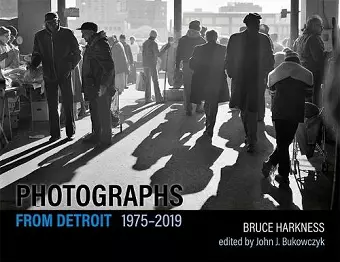Photographs from Detroit, 1975–2019
Bruce Harkness author John J Bukowczyk editor
Format:Paperback
Publisher:Ohio University Press
Published:20th Sep '22
Currently unavailable, and unfortunately no date known when it will be back

With these intimate social documentary photographs and oral histories, Bruce Harkness and John J. Bukowczyk have sensitively collaborated with and amplified the stories of Detroit’s often overlooked people and lost neighborhoods. The result is an unforgettable portrait of Detroit’s hard-won resiliency.
A retrospective survey of Bruce Harkness’s striking social documentary photographs and an invaluable historical record that bears witness to irrevocably lost swaths of Detroit’s social and urban fabric.
In 1980, the cities of Detroit and Hamtramck, Michigan, exercised eminent domain to develop nearly five hundred acres of land for a new industrial park and General Motors assembly plant. But the land was not vacant. Some thirty-five hundred people lived there in Poletown—some of them for their entire lives. They attended neighborhood schools and churches, worked for and patronized small businesses, walked the sidewalks, drove the streets, and tended to lawns and gardens. Harkness began photographing the area in February 1981. He recorded street scenes, intersections, panoramic views, homes, businesses, churches, and people. Ten months, ninety visits, and six hundred photographs later, it all disappeared forever.
The Poletown series established Harkness as a major Detroit documentarian. It came on the heels of late-1970s projects located in and around the city’s skid row: Cass Corridor. The images include gritty streetscapes, a portrait series depicting residents living in a crumbling apartment building, and the lively cultural milieu of a local gay and transgender bar. Most of this old portion of inner-city Detroit since has been supplanted by urban redevelopment and gentrification.
During the late 1980s, Harkness collaborated with urban historian John J. Bukowczyk on a major documentary project, Urban Interiors. While the Poletown project had documented the exteriors of buildings and streetscapes on Detroit’s East Side, Urban Interiors captured the insides of inner-city Detroit homes and businesses and included extended oral history interviews.
While Harkness has always found human dignity and resilience in his subjects, the tone of his work brightened in the 1990s alongside Detroit’s revival. Photographs from this era include blues musicians performing in clubs and at outdoor concerts and the distinctive, robust youth culture that flourished in Dearborn’s now-defunct Zone Coffee House.
Featuring images from these and other projects, Photographs from Detroit, 1975–2019 includes Harkness’s extensive notes, which describe and contextualize the encounters he shared with the people and places he photographed, and offer insight into his working methods and equipment. The volume and quality of Harkness’s work merits him recognition as one of Detroit’s most important documentary photographers during...
“Bruce Harkness is a masterful hunter, communicator, and seer in the visual language of photography. His photographs are charged with an emotional level that transfixes the viewer into wanting to know more.” -- Adger Cowans
“In the 1950s, the avant-garde group known as the Situationist International developed the concept of dérive (French: drift) to describe a method of serendipitously navigating the urban environment to reveal its objective and subjective conditions, to disclose not only how things look but how they feel. Over a lifetime of circumambulating Detroit’s environs, photographer Bruce Harkness has observed the often-neglected people and places of the city to expose, as it were, the essence of its otherwise marginalized physical, social, and emotional spaces. In these much-vaunted times of Detroit as a ‘Comeback City,’ the photography of Bruce Harkness calls upon us to pause and take note of what too often gets left behind in the march of ‘progress.’” -- Vince Carducci, dean emeritus, College for Creative Studies
”An incredibly beautiful and elegantly constructed body of work…[with] masterful editing. The captions are unpretentious and straightforward, like the images, which navigate the years with honesty and sensitivity. Love it, man. Bravo.“ -- Brian Day, award-winning Detroit street photographer
“Harkness’s photography portrays the undulating moods of shadow and light refracted in a community’s afterlife and rebirth, like the image of jazz great Marcus Belgrave reconfiguring loss into belief flowing from his trumpet.” -- Melba Joyce Boyd, distinguished professor in African American studies, Wayne State University, and author of Discarded Legacy: Politics and Poetics in the Life of Frances E. W. Harper, 1825–1911
“In this collection of intimate portraits, ragged streetscapes, and lively clubs and coffeehouses, Bruce Harkness depicts the stark beauty of Detroit and its people. Sometimes heartbreaking, sometimes uplifting, and always beautiful, Harkness captures both the city’s struggles and its profound resilience.” -- Thomas J. Sugrue, author of The Origins of the Urban Crisis: Race and Inequality in Postwar Detroit
“Unsentimental but deeply human, Bruce Harkness’s photographs draw you in to every detail—into the tales told by every crack in the plaster, every poster on the wall, every storefront and front stoop. They compel you to look in every eye and, in these moving images of brick and mortar and flesh and blood, to read the stories of the communities we create and those we leave behind.” -- Karen Majewski, author of Traitors and True Poles: Narrating a Polish-American Identity, 1880–1939 and former mayor of Hamtramck, Michigan
“Bruce Harkness spent decades walking the streets of Detroit and photographing the people he met along the way. His images capture not just a street-level view of Detroit’s human tapestry, but the very soul of this city.” -- Peter O'Keefe, filmmaker and editor of A Brief Peculiar History of Detroit
“We tend to think of history as a written record established by others. Photographs from Detroit, 1975–2019 takes you on a rare journey back in time, showing how history is written by the people who live it.” -- Nadja Rottner, professor of art history, University of Michigan-Dearborn and editor of Cardiovista: Detroit Street Photography
ISBN: 9780804012386
Dimensions: unknown
Weight: unknown
200 pages